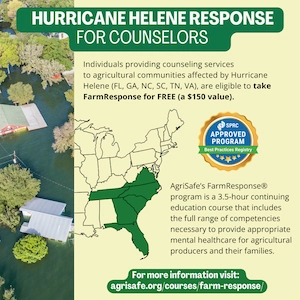Last updated on July 24th, 2024 at 11:01 am
Spirituality Resources
The Center for Disease Control and Prevention, in Health-Related Quality of Life, indicates spirituality is a pathway we use to find meaning, hope, comfort, and inner peace. Historically, rural families and agricultural workers experience spirituality through their connection with nature, their values and principles, faith-based practices, and the arts. This connectedness plays an important role in many rural communities.
Science and research tell us that the body, mind, and spirit are connected and impact our well-being. The health of any one of these elements affects the others. AgriSafe understands spiritual health may not cure an illness, but it may help us feel better. It also may help to prevent some health problems and aid in coping with illness, stress, separation from loved ones, loss or changes in jobs, or death.
Religion and spirituality are major components of an individual’s culture and play an important role in rural communities. Spirituality and religiosity are substantively related to each other, as both are connected to the idea of the sacred. Research has clearly indicated that there is a need to make distinctions between the two concepts, particularly when examining health behaviors. Although definitions vary, spirituality is typically aligned with subjective, personal beliefs, whereas religiosity is identified with traditional, institutional-related practices.
Spirituality Resources
Articles
- Incorporating Spirituality in Primary Care
- Spiritual Assessment: A Nursing Responsibility
- Spiritual Care in Nursing: An Overview of the Measures Used to Assess Spiritual Care Provision and Related Factors Amongst Nurses
- The Effect of Spirituality on Health and Healing: A Critical Review for Athletic Trainers
- The Relationship Between Spirituality, Health-Related Behavior, and Psychological Well-Being
Podcast Episodes
Toolkit
Websites
Page updated: July 2021

